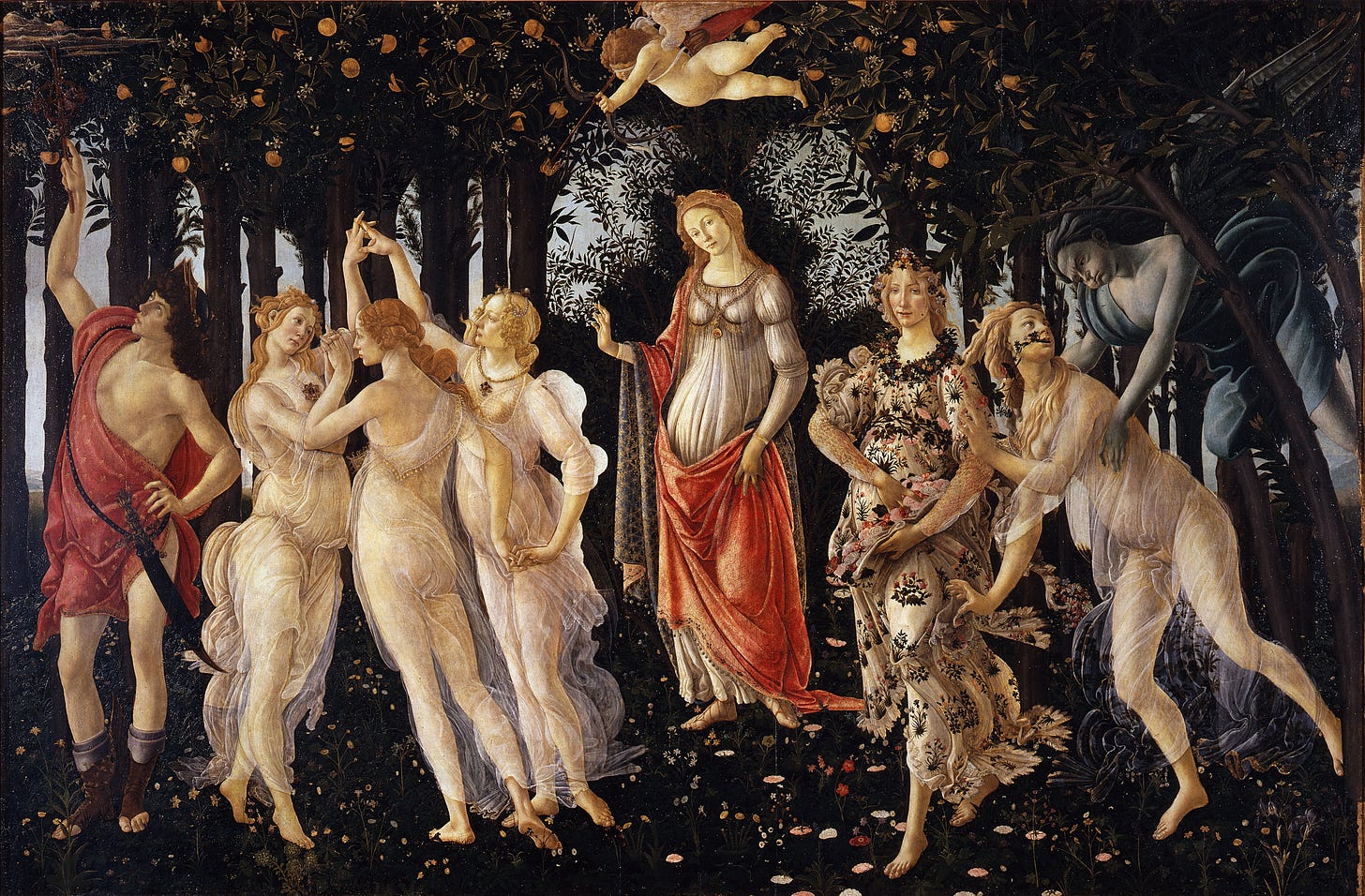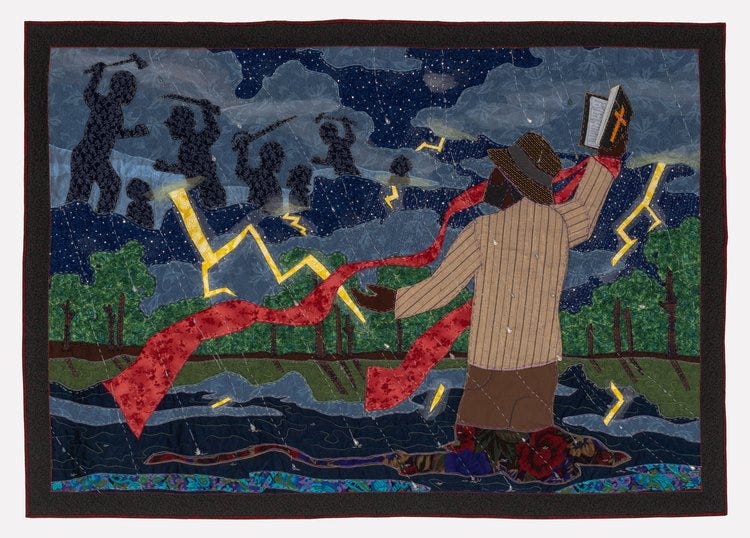Your Fav is Woo: Polaris Manifesto Part 3
I am a commitment to the weird and the woo
Greetings! This is Part 3 in a series about myth, speculative fiction, and social change. Catch up on the rest of the series using the links below.
Part 0: Introducing the Polaris Manifesto (article)

Weirdo…or Genius?
This might be one of my favorite realizations from my mythological studies training: bruh, your fav is woo.
So many of the most prolific, renowned historical figures have mystical and myth-making tendencies. Don't believe me? I can rattle off a list of at least a dozen public and historical figures whose inclinations towards the woo have impacted their work.
Take Sir Isaac Newton, for example, one of the leading thinkers of the Scientific Revolution and muse of the Enlightenment period. We credit him for the theory of gravitation, but did you know that he was also super into alchemy? Alchemy is the proto-scientific predecessor to chemistry wherein people were very literally trying to convert lead to gold. Then some of them realized that the alchemical process of transformation was less material and more psycho-spiritual, leading to the alchemical gold of authentic being—whether that was a state of divine purity or self-realization. I'll cite Jeffrey Kripal at length here because I'm a big fan of his work, and he sums up my point perfectly:
We must be very careful not to see here a simple progression from magic to religion to science, as so many thinkers of the nineteenth century did. A figure like Isaac Newton, for example, not only gave us a model of gravity and the foundations of modern calculus. He also believed in biblical prophecy, wrote about Atlantis, and practiced alchemy, a kind of magical chemistry that sought to turn matter into gold, and in some cases, the human being into an immortal one.
Comparing Religions, 2014, p. 102
Central to the alchemical opus is interaction with the elements to transform matter. Alchemists and magicians engage with the divine in the material world, including human divinity, to influence fate. The practice wasn't just odd dudes in a lab with beakers and dusty books, but a lot of the world's most famous visual and literary arts engaged magical and alchemical themes, especially works from the Renaissance. Botticelli's Primavera is one of the most celebrated paintings of the era, and it is teeming with references to alchemy (see image above). Also, a close reading of The Tempest by Shakespeare reveals how closely he studied alchemy in the works published during the Renaissance.
The Scientific Revolution and the Renaissance are just two historical periods that show how myth and magic are inseparable from human nature. More recent—and my personal favorite—examples of the human myth-making tendency, come from feminist and liberatory thinkers. Part 2 of the Polaris Manifesto was all about how Octavia Butler was maybe-or-maybe-not a prophet. There's also a story in vernacular folklore that Harriet Tubman began having visions after surviving a traumatic brain injury while she was enslaved. Similarly, Nat Turner claimed to have direct and indirect experiences of the Christian God, including at least one appearance that inspired his famous 1831 rebellion.

Continuing, a lesser known aspect of Gloria Anzaldúa's work was about spiritual activism, which weaves Indigenous, mystical, and esoteric traditions into mechanisms for personal and collective liberation. Even more recently, Prentis Hemphill has shared a story on their podcast Becoming the People about a night in their twenties when they "dropped into the pure presence of Spirit" and felt love for the first time. Also, bell hooks oft-cited All About Love discusses love as a spiritual practice (Chapter 5), in keeping with many world religions.
Recently Alexis Pauline Gumbs published one of my favorite books, Undrowned, about building relationships with marine mammals to learn from them and converse with them about new visions for the world. Oprah's Super Soul Sunday is a (problematic) pop culture example of the woo in action, highlighting the ideas and experiences of mystics and religious figures to help make spiritual development information more accessible. It is also said that Dr. King's "I Have Been to the Mountaintop" sermon, the last public speech before his assassination, was a premonition about his imminent death.
I was very serious about that list of a dozen famous figures of the woo.
Weird is the Wave
I have a bit of a complex about being "weird" though I am learning to embrace it. Mythological studies and age are helping me welcome my own strangeness. When I began to retrospectively recognize and decipher myth and mysticism in history, it freed me to be as odd a bird as I wish. If so many of the people I admire in the world were into "weird" stuff, then I'm in good company.

I take inspiration from liberation theologian and mystic Howard Thurman who said, “Don’t ask what the world needs. Ask what makes you come alive and go do that, because what the world needs is more people who have come alive.” Studying mythology and the weird stories and people of the world has enlivened and emboldened my research, shifting my interactions with their work from those of a distant admirer to a dutiful descendant responsible for stewarding our collective dreams of freedom. Myth studies helped free me to be more myself, tapping a well of creativity that desires little more than wielding this weirdness to free us all from systems of dominance that have me believing I'm weird in the first place.
Stephen Towns' multimedia series A Night Light Fell from the Sky shows the story of the November 1833 Leonid meteor shower from the perspective of enslaved people in the U.S. Some say the celestial phenomenon was a revelation and an omen of the Civil War and the end slavery in the U.S.
Like the meteor shower that foretold freedom for my ancestors, my most sincere dream is that my work is a beacon of hope for the new worlds we can only create together, worlds unashamed of the weird and the woo, that honor the legacies of Harriet and bell and the conjurers and witch doctors and saints and midwives—innumerable and unnamable ancestors and descendants with whom we collaborate for our liberation.
Creative Prompts
Use these prompts to pull a new world from your imagination. Whether you're a writer, a visual artist, a musician, or something in-between, use that spark of imagination to invite us into your creative vision.
In what areas of life do you experience feeling weird? How does that sense of difference give you an advantage? In what ways is it a disadvantage?
What does the term "woo" mean to you?
Who are the people in your life and lineage that seem touched—by the stars, divine, other realms, etc.?
Beyond the five senses, what ways of knowing can you access?
What is your favorite "urban legend" or story from folklore?
CEUs
It's important to me to share other audio, text, and video resources that may help you tap into the wave of wisdom that informed this part of the Polaris Manifesto. I've curated several free resources on Are.na for you to enjoy, and a shorter list of pdf and epub materials for paid subscribers below. Enjoy!
Note: This post contains affiliate links. If you choose to purchase books using my Bookshop affiliate links, I will receive a small commission on your purchase.
Thea Anderson, The Astrology of the Legacy of Harriet Tubman lecture summary
Prentis Hemphill on Harriet Tubman from Becoming the People podcast
AnaLouise Keating, Archives of the Impossible lecture on "Cultivating the 'Impossible' with Gloria Anzaldúa: Towards a Transformational Politics of Spirit" video
Stephen Towns, Nat Turner Story Quilts and The Night Light Fell from the Sky
Finley, Guillory, and Page Jr., Esotericism in African American Religious Experience book
Witchdoctor Utu, Conjuring Harriet "Mama Moses" Tubman book
Martin Luther King, Jr., “I Have Been to the Mountaintop” sermon video
Jeffrey Kripal, Mutants any Mystics: Science Fiction, Superhero Comics, and the Paranormal book
For paid subscribers
Keep reading with a 7-day free trial
Subscribe to Between Starshine and Clay to keep reading this post and get 7 days of free access to the full post archives.
